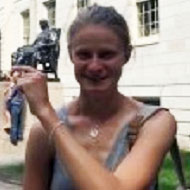
Rebecca McLean and Georgina Charnley have shared their advice on careers in research.
Two Bioveterinary Science graduates from Harper Adams University have shared their advice on getting involved in research.
Rebecca McLean, a postdoctoral project manager at The Pirbright Institute, and Georgina Charnley, a PhD student in the Department of Infectious Disease Epidemiology at Imperial College London, both studied for a BSc (Hons) in Bioveterinary Science at Harper Adams.
The researchers shared their advice and experiences in a webinar hosted by Harper Adams University, to help encourage current students.
Georgina is currently working on PhD research examining how cholera outbreaks link to humanitarian crises in Africa, and her work examines how natural hazards and conflicts can result in outbreaks of infectious disease – along with the changing factors across the world which can alter this.
Rebecca went on to study a PhD after graduating from Harper Adams, and then got a postdoctoral job at The Pirbright Institute, running an international consortium, aiming to develop a vaccine against Nipah virus for pigs.
“In the webinar we discussed our career progression since leaving Harper, the challenges we have faced, where we went on placement, our advice for students trying to compete their degree during a pandemic,” Georgina said.
She also reassured students who aren't completely sure what they want to do with their degree yet, saying: “I would say don’t worry if you aren’t sure what you want to do, or if you are on the exact right path, just make sure that you study hard and try to get the best possible grade you can.”
“This shows you have the ability to excel in a subject and work independently and as a team, which is essential in any career. These transferable skills mean that you can then switch to working in whatever field you want either by going into the role or through further education.”
Rebecca shared similar advice to Georgina, reminding students that veterinary practice work is not the only option, and that a career in research is a possibility for them.
Keen to remind students of the reality of a career in research, Rebecca commented: “Keep persevering! Setbacks are inevitable but these things happen for a reason and there is always something better around the corner for you.
“Without my placement year at The Animal Health Trust, I would never have been offered my PhD position. My placement was an unpaid one, but completely and utterly invaluable to my career success.”
Rebecca also shared her current work, giving students an insight into what its like to be a researcher, and what kind of things are possible.
“My PhD focussed on the development of a multivalent vaccine delivery system and for proof of concept I developed a novel vaccine against Chlamydia abortus, a zoonotic sheep pathogen which can seriously harm - and sometimes kill - pregnant women.
“My job at Pirbright followed a similar path whereby I have been developing vaccines against Nipah virus. This virus is spread from pigs to humans and carries a 75-100% mortality rate in humans. Therefore the idea is to vaccinate the pigs, to safeguard human health.
“This job put me in a very strong position to help in the fight against COVID-19 and since March 2020 I have been leading a team that are testing the most promising COVID-19 vaccines in pigs to aid and guide the human trials.”



 The latest
The latest